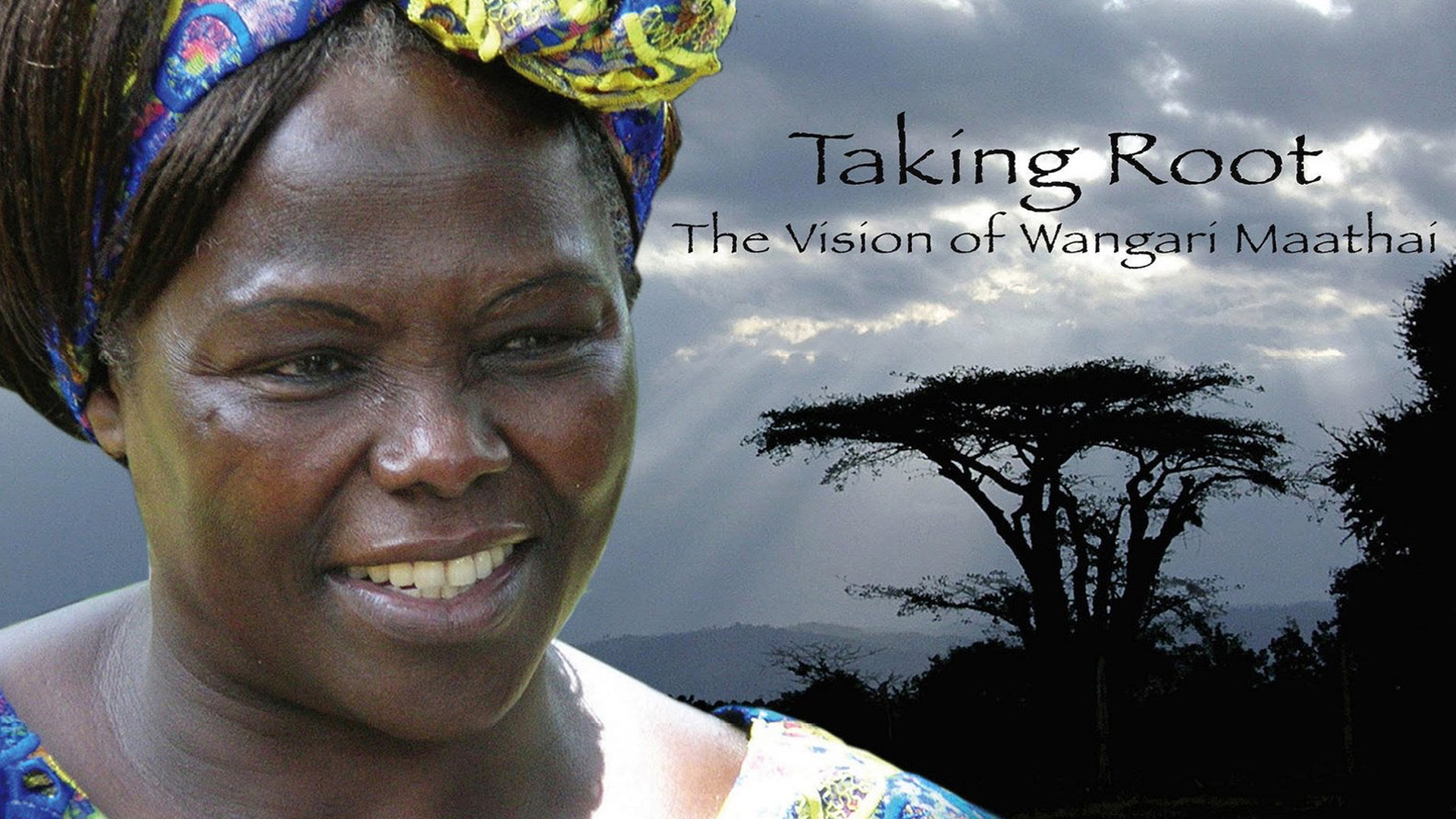
Taking Root: The Vision of Wangari Maathai
by Lisa Merton & Alan Dater
The dramatic story of Kenyan Nobel Peace Prize Laureate Wangari Maathai's treeplanting revolution.
2008 · 1h19m · Kenya
English
Spanish subs
Share
About the Film
Planting trees for fuel, shade, and food is not something that anyone would imagine as the first step toward winning the Nobel Peace Prize. Yet with that simple act Wangari Maathai, a woman born in rural Kenya, started down the path that reclaimed her country’s land from 100 years of deforestation, provided new sources of food and income to rural communities, gave previously impoverished and powerless women a vital political role in their country, and ultimately helped to bring down Kenya’s twenty-four-year dictatorship.
TAKING ROOT weaves a compelling and dramatic narrative of one woman’s personal journey in the context of the turbulent political and environmental history of her country. Raised in the rural highlands of Kenya, educated in the United States during the 1960s civil rights era, and the first female to receive a PhD in East Africa, Maathai discovered the heart of her life’s work by reconnecting with the rural women with whom she had grown up. They told her that their daily lives had become intolerable: they were walking longer distances for firewood, clean water had become scarce, the soil was disappearing from their fields, and their children were suffering from malnutrition. Maathai thought to herself, “Well, why not plant trees?” Trees provide shade, prevent soil erosion, supply firewood and building materials, and produce nutritious fruit to combat malnutrition. With this realization Maathai founded the Green Belt Movement, a grassroots organization encouraging rural women to plant trees. A seemingly innocuous idea, Maathai soon discovered that tree planting had a ripple effect of empowering change.
In the mid 1980s, Kenya was under the repressive regime of Daniel arap Moi under whose dictatorship group gatherings were outlawed. In tending their nurseries women had a legitimate reason to gather outside their homes and discuss the roots of their problems. These grassroots women soon found themselves working successively against deforestation, poverty, ignorance, embedded economic interests, and political oppression, until they became a national political force. As the trees and the Green Belt Movement grew, a spirit of hope and confidence also grew in ordinary citizens – especially in women – only to be met with violent opposition from the government. Maathai and her colleagues soon found themselves victims of President Moi’s political oppression. In response, Maathai’s political activism only grew. At great risk she lead numerous confrontations in defense of the environment and social justice each of which brought her country closer to democracy.
Through TV footage, newspaper headlines, and chilling first person accounts, TAKING ROOT documents these dramatic confrontations of the 1980s and 1990s and captures Maathai’s infectious determination and unwavering courage. Through perseverance and widespread grassroots organization, Kenya’s fight for democracy finally prevailed. In 2002 a new democratically elected government replaced Moi’s, and Maathai became a member of the new Parliament and Assistant Minister of the Environment and Natural Resources. And the trees continue to grow. Today there are more than 6,000 Green Belt nurseries throughout Kenya that generate income for 150,000 people, and thirty-five million trees have deeply altered the physical and social landscape of the country. The Green Belt Movement has also started programs teaching women about indigenous foods, income generating activities, AIDS, and self-empowerment. Through cinema verité footage of the tree nurseries and the women and children who tend them, TAKING ROOT brings to life the confidence and joy of people working to improve their own lives while also ensuring the future and vitality of their land.
Through intimate conversations with Maathai, whose warm, powerful, and luminous presence imbues much of the film, TAKING ROOT captures a world-view in which nothing is perceived as impossible, presenting an awe-inspiring profile of one woman’s thirty-year journey of courage to protect the environment, ensure equality between men and women, defend human rights, and promote democracy–all sprouting from the achievable act of planting trees.
Upcoming Screenings
Stay tuned for upcoming screenings!
Festivals and Awards
2008
Rencontres Internationales du Documentaire de Montréal (RIDM), Winner, Audience Choice Prize
2008
Rencontres Internationales du Documentaire du Montréal (RIDM), Winner, Prix Ecocamera (Ecocamera Award)
2008
Vermont International Film Festival, Winner, Margaret Blank Award for Storytelling
2008
Durban International Film Festival, Winner, Amnesty International Durban Human Rights Award
2008
Maui Film Festival, Winner, Green Cinema Award
2008
Nashville Film Festival, Winner, Best Documentary Feature, Honorable Mention
2008
Nashville Film Festival, Winner, Nashville Women in Film & Television Award for Best Feature Length Film Directed or Co-Directed by a Woman
2008
Full Frame Documentary Film Festival, Durham, North Carolina, Winner, Full Frame Women in Leadership Award
2008
Hot Docs Canadian International Documentary Festival, Winner, Audience Award Winner
2008
Projecting Change Film Festival, Vancouver, Winner, Audience Award
Editor
Alan Dater
Editor
Jim Klein
Editor
Mary Lampson
Editor
Tom Haneke
Producer
Lisa Merton
Producer
Alan Dater
Cinematographer
Alan Dater
Soundtrack Composer
Samite



